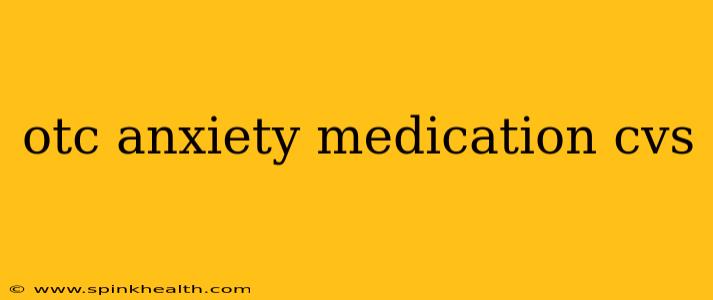Anxiety. That familiar knot in your stomach, the racing heart, the overwhelming sense of unease. It's something millions experience, and sometimes, finding quick relief is crucial. Many people turn to over-the-counter (OTC) medications for temporary symptom management. This guide explores your options for OTC anxiety medication at CVS and other pharmacies, and more importantly, helps you navigate the choices wisely.
What OTC Medications Treat Anxiety Symptoms at CVS?
CVS, like most pharmacies, stocks a range of products that can help manage some anxiety symptoms. However, it's crucial to understand that these medications don't "cure" anxiety. Instead, they target specific symptoms like nervousness and restlessness. Commonly found options often include:
-
Diphenhydramine (Benadryl): While primarily known as an antihistamine, Benadryl's sedative effects can sometimes provide temporary relief from anxiety-related insomnia or restlessness. It's important to note that it's not a dedicated anxiety medication and shouldn't be relied upon for long-term management.
-
Certain Herbal Supplements: CVS carries a variety of herbal supplements marketed for stress and anxiety relief. These often include ingredients like chamomile, valerian root, and ashwagandha. While some people find these helpful, scientific evidence supporting their effectiveness is often limited or inconsistent. Always talk to your doctor before using herbal supplements, especially if you are taking other medications.
-
Melatonin: This hormone regulates sleep. For some, anxiety manifests as sleep disturbances. Melatonin might help improve sleep quality, indirectly easing some anxiety symptoms, but it's not a direct treatment for anxiety.
What are the Differences Between OTC and Prescription Anxiety Medications?
This is a crucial distinction. OTC medications address symptoms, offering temporary relief. They are generally weaker and less targeted than prescription medications. Prescription medications, on the other hand, are specifically designed to treat anxiety disorders. They are usually stronger and offer more consistent relief, but they also carry potential side effects and require a doctor's prescription.
Are There Any Risks Associated with Using OTC Anxiety Medications?
Yes, even OTC medications can carry risks.
-
Drowsiness: Many OTC options, like diphenhydramine, can cause drowsiness. Avoid driving or operating machinery if you experience this.
-
Interactions with Other Medications: Always check for potential drug interactions, especially if you are taking other medications, prescription or over-the-counter.
-
Allergic Reactions: Be aware of potential allergic reactions and stop use immediately if you experience any.
-
Ineffectiveness: OTC medications may not be effective for everyone, particularly those with severe or chronic anxiety.
What are the Best Practices for Managing Anxiety?
While OTC medications can provide temporary relief, they are not a long-term solution for anxiety disorders. For sustained management, consider a holistic approach:
-
Therapy: Cognitive Behavioral Therapy (CBT) and other therapeutic approaches are highly effective in treating anxiety.
-
Lifestyle Changes: Regular exercise, a balanced diet, sufficient sleep, and stress-reduction techniques like meditation or yoga can significantly improve anxiety symptoms.
-
Prescription Medications: If your anxiety is severe or significantly impacting your life, consult a doctor about prescription medications.
When Should I See a Doctor About My Anxiety?
If your anxiety is persistent, interfering with your daily life, or accompanied by other symptoms like panic attacks or significant distress, seeking professional help is crucial. Don't hesitate to consult a doctor or therapist. They can provide a proper diagnosis and develop a personalized treatment plan.
Can I use OTC Anxiety Medication long term?
No. OTC anxiety medications are intended for short-term relief, not long-term management. Prolonged use without medical supervision can be harmful and may even lead to dependence. If you need ongoing anxiety management, seek professional guidance.
This information is for general knowledge and does not constitute medical advice. Always consult with a healthcare professional before starting any new medication or treatment, including over-the-counter remedies. They can assess your individual needs and recommend the most appropriate course of action.

